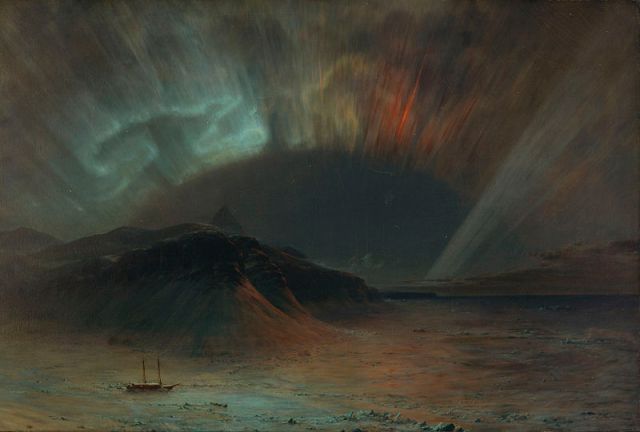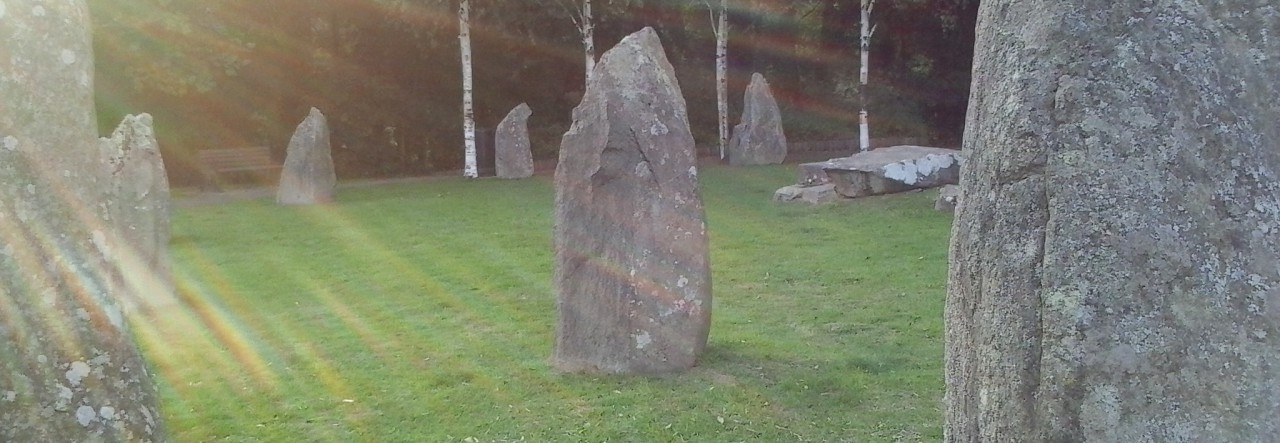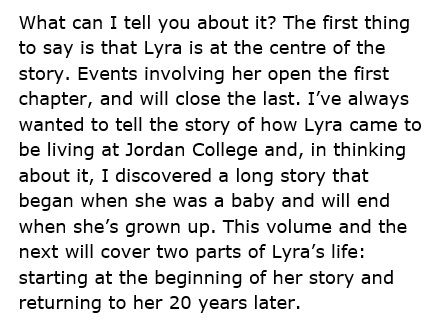
Nicholas Tucker
Darkness Visible: Inside the World of Philip Pullman
Wizard Books 2003
Fans of Philip Pullman’s His Dark Materials trilogy will have been cheered by the announcement of the publication of the (as they say) long-awaiting follow-up entitled The Book of Dust. Like HDM this will appear in three volumes, and the first — titled La Belle Sauvage — will be published in October this year by Penguin Random House Children’s and David Fickling Books in the UK, and Random House Children’s Books in the US, according to the author’s own website.
The first thing to say is that it covers all of Pullman’s varied fiction up the 2000, not just HDM, though the bulk of the discussion does indeed centre around the trilogy. A brief illustrated biography outlines the author’s interesting upbringing, career and influences. (Don’t all people’s backgrounds have some unusual aspects to them? I wonder how much that affects their potential to become writers.) The discussion continues with Pullman’s early successes, including the thrilling Sally Lockhart series mostly set in an alternative late Victorian Britain; it was with these books that he honed his skills at combining suspense, moral conundrums and a steampunk aesthetic with strong protagonists, some of whom he was quite prepared to bump off if the evolving plot dictated it.
Teaching gave him opportunities to write and stage amusing yet spine-tingling school plays which, unsurprisingly, were often set in that 19th century that so fascinated him (for example the ‘novelised’ Count Karlstein which featured dark doings in Central Europe). As well as a couple of pre-2000 adult novels (which the author would rather forget) he also wrote other standalone novels, at least one of which — The Broken Bridge — drew on his own childhood growing up as a teenager in Wales, others of which were designed to appeal to slightly younger readers. Tucker is not afraid to be mildly critical of Pullman’s efforts in this other fiction, reserving his outright praise for HDM.
As well as outlining the narrative thrust Tucker examines its key themes. First are the two young protagonists, kickass Lyra Belacqua and tragic Will Parry, distinctive yet sympathetic characters who have such crucial roles in HDM’s universes. Tucker goes on to discuss the tension between science and organised religion that is the mainspring for the trilogy’s action. Another section compares and contrasts HDM’s matter with Pullman’s acknowledged web of literary influences, some antithetical (such as C S Lewis’ Chronicles of Narnia) and others more positive, mainly Milton and William Blake. We even get to hear of the philosopher and journalist Heinrich von Kleist, a piece by him (“On the Marionette Theatre“) being featured as an appendix: its themes include the consequences of eating fruit from the Tree of Knowledge and a duel with a fighting bear, motifs which feature strongly in HDM. (Perhaps not insignificantly, Will Parry shares his surname with the late academic Idris Parry who not only translated this essay in 1981 but also such classics as Kafka’s The Trial for Penguin Books.)
In this review of novels as intellectual as they are entertaining, Tucker inevitably has to examine Pullman’s personal philosophy. It helps that many of Pullman’s admirers — and I am one of them — will agree with many if not most of the writer’s tenets, just as there will be some for whom his views on religion, science and personal responsibility will be complete anathema.
Before a select bibliography and the Kleist essay Tucker signs off with some concluding remarks. He ends with an adulatory statement which I’m in no position to confirm but which neatly sums up his assessment:
“[Pullman’s] trilogy, with its extraordinary power and unforgettable impact, represents the culmination of a long apprenticeship in writing, starting off the day after he left university and finally climaxing in one of the most ambitious and far-reaching works of imagination ever to appear in either children’s or adult fiction.”
Whether or not you agree with this maybe contentious final judgement there’s no doubt that HDM is an extraordinary achievement, one that this text more than adequately serves to introduce. Incidentally, Darkness Visible has been republished this year with a new subtitle (Philip Pullman and His Dark Materials) by Icon Books with a claim that it offers “essential reading ahead of The Book of Dust“.


Ah, I might just read this!
LikeLiked by 1 person
I’m assuming then that you’ve read the Pullman trilogy, Sue — that way you won’t be troubled by any spoilers!
LikeLiked by 1 person
I have indeed!
LikeLiked by 1 person
🙂
LikeLiked by 1 person
Hum. I’m not sure I’ll be able to read this Book of Dust. I adored the first two HDM books (was already familiar with Sally Lockhart; my favorite was Tin Princess). The Amber Spyglass was so disappointing that I never read any of them again. They sat on my shelves for years like a toothache until I finally got rid of them.
LikeLiked by 1 person
Jean, I know what you mean: I found The Amber Spyglass a struggle to get through as well as terribly hard to like. The whole episode with the mulefas felt out of place and if there was a point I couldn’t see how it related to the rest of the narrative.
Having said all that, with time and hindsight I find I’m intrigued and that the mystification is becoming something I want to get to the bottom of, hence my hopes for a reread this year. But I appreciate that this process won’t appeal to everyone, and heaven knows there’s enough else out there to read, experience and enjoy!
LikeLike
I didn’t dislike Spyglass but I was bothered by the meaning and relevance of the mulefas. I should do a re-read.
LikeLiked by 1 person
Yes, it’s really time for my reread of all HDM too, and to get to the bottom of the mulefa subplot.
LikeLike
I can forgive Phillip Pullman anything for Northern Lights. Definitely one of the best books I have ever read. I wish I could persuade Other Gert to read it. I cant wait for The Book of Dust
(Sally Lockhart is pretty good too).
LikeLiked by 1 person
The Guardian featured an extract from La Belle Sauvage in one of its recent review supplements, and it’s also available online if you’re curious. I agree, Northern Lights pulled me in within a couple of pages, and especially the notion that a young girl could initiate a series of adventures just by hiding in a wardrobe (where have we encountered that opening gambit before?)!
Yes to Sally Lockhart too, a sort of precursor to Lyra Silvertongue in a way but also very individual.
LikeLike